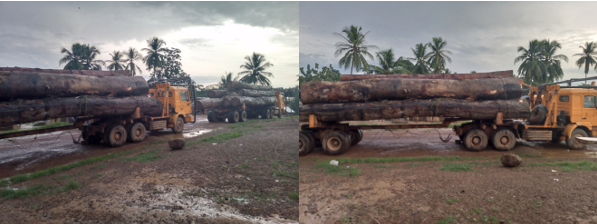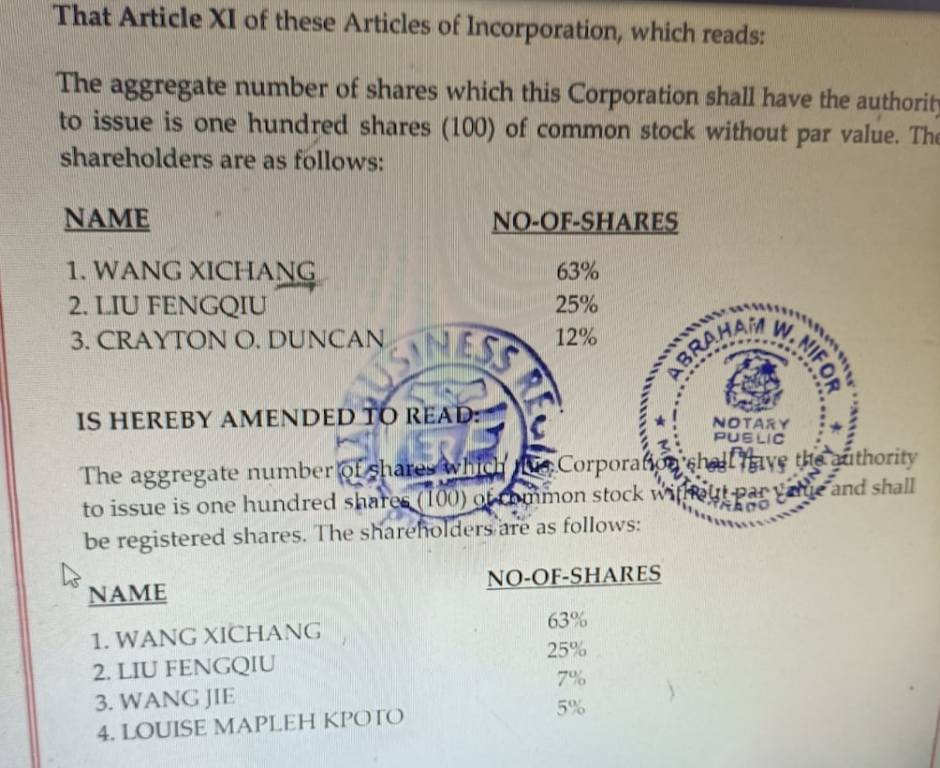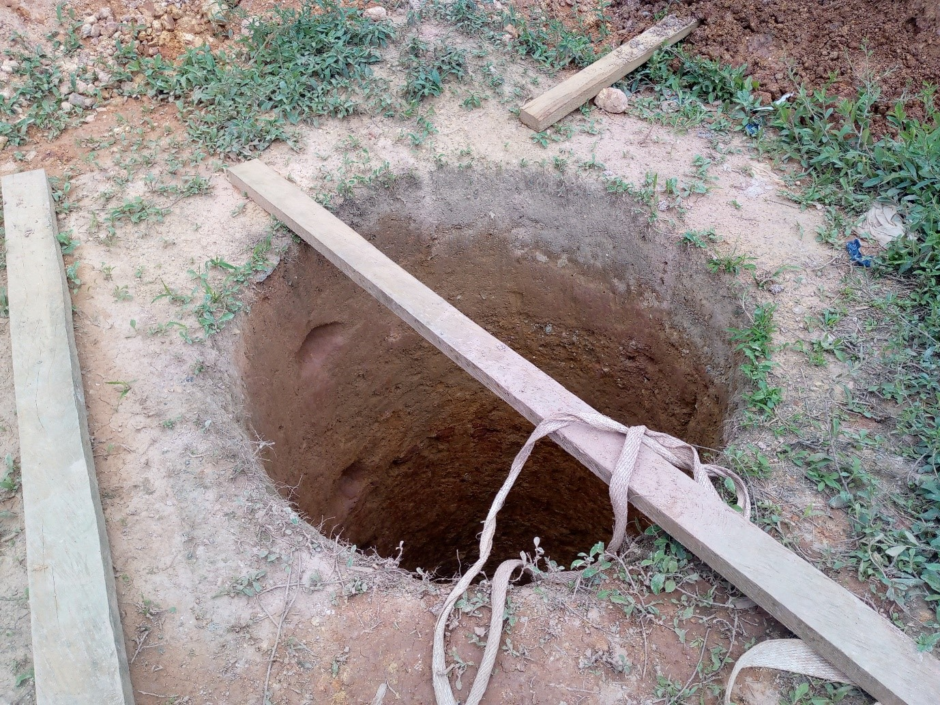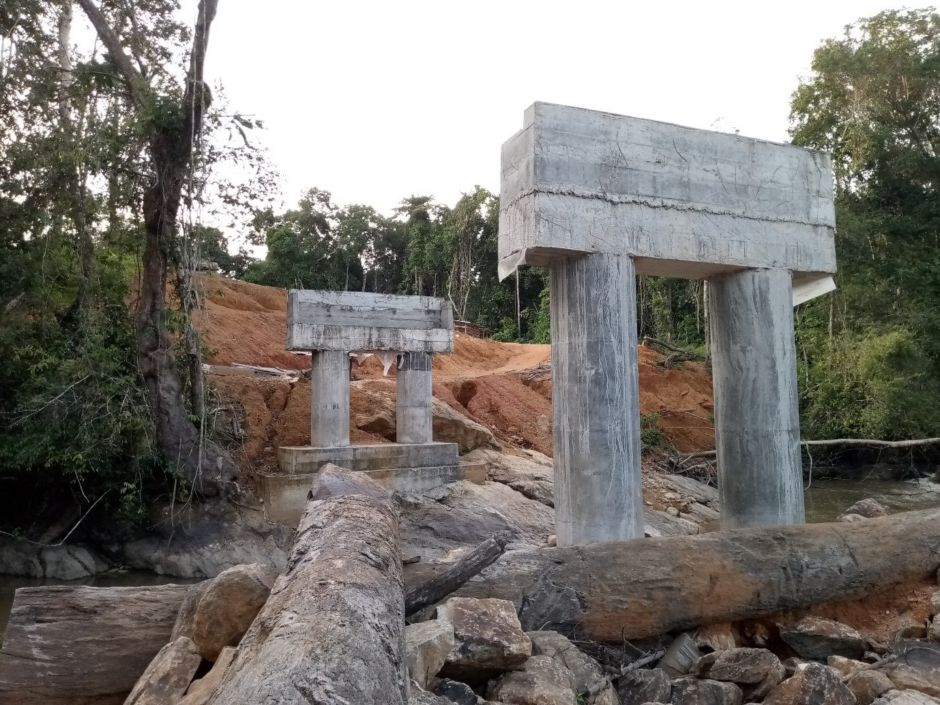
GEELARDRO, Sinoe County – Community members here in Tartweh and Drapoe chiefdoms are fuming over a range of what they claim are violations of Liberian laws by the country’s forest management body the Forestry Development Agency.
The community alleged the Agency has forged a concession agreement, seized land and illegally granted a logging concession to a company owned by Sinoe County lawmaker Crayton O. Duncan. After years of fighting, the community said they feel powerless.
“We have nowhere to carry our complaints,” said Victoria Saydee a member of the Community Assembly. “The government that we supposed to run to is involved. Then the lawmaker has a share, so we can’t do anything.”
The community’s troubles began in 2019 when they say they tried to enter into an agreement with the Atlantic Resources only to have Representative Duncan disrupt the signing ceremony and replace Atlantic with his own newly-formed company SinoForest International Corporation to harvest and ship round logs from Tartweh-Drapoh Community Forest.
After numerous complaints to the FDA went unanswered members of the Community Forestry Management Body (CFMB) said they finally gave in and signed a Memorandum of Understanding (MOU) with SinoForest in June 2021. The CFMB’s original version, shown to FPA/NN, stated that 33,162 hectares would be included in the concession. But when the MOU came back six months later the CFMB alleged it had been changed.
“They (the company) told the people they were carrying the signed MOU to the Managing Director of the FDA to sign it and bring it back to the community,” said Konwolo Wesseh, head of the Society for the Conservation of Nature, a local organization campaigning for the conservation of community forests. “But unfortunately, when they carried it to the Managing Director, it was altered.”
The final version included a portion of the community’s forest that CFMB representatives said they never agreed to, giving the company access to another 6,000 hectares. The community was given a copy of the signed and allegedly altered MOU but they said the FDA has refused to return the original. Mike Doryen, FDA Managing Director, and Shelton Gonkerwon, public relations officer, ignored requests to provide the document. After filing a Freedom of Information request NN/FPA received the FDA’s signed official version of the document, which confirms the community’s claims.


Wesseh, along with Augustin Swen, Chair of Tartweh and Drapoh Chiefdoms, said the FDA was not playing its role as a regulating body.
“We expected the FDA to be the watchdog for all community forests,” said Swen. “But they were specifically involved in SinoForest company activities just like they were the owner of the company.”
Underscoring the community’s claim is the fact that both the original and the returned copies of the MOU state “the company shall pay 55% of the total USD $1.25/ha land rental fee, amounting to a total of $US23,074.00 per year … to the community.” This amount equates to a total land area of 33,162 hectares – the amount in the original agreement – not the more than 39,000 in the returned agreement.
Not only is the size of the concession changed, the FDA version includes a different map. The original MOU contains a map with the inscription “Deeded Land Map of Tartweh-Drapoh Community Forest. 33,162 hectares located in Sinoe County.” But the map in the second version has no mention of the size of forest. It covers the Tartweh and Drapoh Authorised Community Forest and extends to the University of Liberia Forest in Lower Tartweh Chiefdom.
Timothy Swen, a member of the CFMB, said the company has already begun harvesting logs from the forest outside the area that the CMFB agreed to. FDA public relations officer Gonkerwon and FDA Managing Director Doryen have not responded to WhatsApp messages and emails asking for comment.

James Otto, of the Sustainable Development Institute (SDI), said it is illegal for a company to operate outside of agreed concession areas. He said the CFMB can take legal action if it can prove that the company is operating outside the concession.
FDA Overlooks Sinoe Representative’s Ownership Stake in Forestry Company
The community also alleged that the FDA had a hand in a second violation of Liberian Forestry Law over this concession. Company documents, obtained by NN/FPA from the Liberian Business Registry, show that in 2019, when the concession was awarded to SinoForest, Representative Duncan had a 12 per cent ownership stake in the company. Liberian law requires government officials to transfer shares in a company to a “blind trust” while they are in office. The blind trust manages people’s businesses at arm’s length to avoid conflicts of interest.
When SinoForest was incorporated in 2019 Duncan was already a sitting lawmaker. The first Article of Incorporation shows Representative Duncan as an incorporator with a 12 percent ownership share in the company. The other two incorporators are Chinese nationals Wang Xichang (63 percent) and Liu Fengqiu (25 percent).

Duncan’s ownership stake in SinoForest was a breach of the Code of Conduct for Public Officials. Running a company while holding a government position also contravenes the National Forest Reform Law, which bars any government official from conducting commercial forestry activities. Violators face a fine of between US$10,000 and US$25,000, up to three times the sum they received from their companies, or a prison term of up to 12 months.
When communities of Tartweh and Drapoh became aware of Duncan’s ownership, they protested forcing the company to issue a new Article of Incorporation in September 2019 that had removed Duncan. His 12 percent share was split between another Chinese national and a Liberian named Louise Mapleh Kpoto. The community said they were unaware of who Kpoto is.

Swen alleged that Duncan has used local police to intimidate people who talk about the illegality of the company. Swen said he was beaten and jailed in August of 2022. He claimed a false allegation was levied against him. He was released after four months without any trial.
Swen alleged that the FDA removed the Myers Kugmeh Padma, Chief Officer of the CFMB, for refusing to agree to the altered version of the document. The FDA is prohibited from choosing members of the CFMB under the Community Forest Law. Padma was replaced with Kwankon F. Saytue, the Secretary of the CFMB. In a conversation, Padma confirmed that he was “illegally replaced” by the FDA but said he would reserve comments “until after the October 10 elections.”
In a telephone conversation, Saytue affirmed that he was appointed by the Managing Director of FDA to act as Chief Officer. “Yes, I have a letter from the Managing Director Office,” he said.
These are just the latest allegations against Duncan. In December News Public Trust/Forest Watch reported that he signed a lease agreement with the Bannah community for 250 acres. Reporters obtained a copy of the alleged agreement, notarized in May 2021, and signed by several community members and Duncan who is listed as “the Executive Director of Sino Forest Liberia”. Duncan refused requests for comment at the time.
Duncan, who is contesting the Sinoe Senate seat against Milton Teahjay in October, did not respond to a WhatsApp message seeking comment, but in a December article he claimed not to have known that he was barred from owning a company as a lawmaker, telling Front Page Africa that he had started SinoeForest after a trip to China with President Weah. “The thing that hurt me is that I am not able to own shares,” he said. “Is it a crime being a lawmaker?” He denied removing the CFMB leadership.
Promised Pumps, Bridges, Schools and Clinics Incomplete
For many in the community, the worst part is the company’s failure to meet any of its obligations to the community laid out on the agreement. The company was supposed to construct a bridge and road plus handpumps, schools, clinics and palava huts. Construction was to be long finished by now, but during an April visit by NN/FPA, none had been completed.
Emmanuel Saywon, former political officer to Duncan and current Human Resources Manager of SinoForest, claimed three handpumps were nearing completion. On a visit to one site, this reporter found only a deep uncovered hole.

Other projects under the agreement include the construction of a concrete bridge over the Planson River in Plasiken and the building of Plasiken-Doodwicken road. Saywon claimed the Planson River bridge was at “75 to 80 percent completion.” A visit by NN/FPA found two concrete pilons in place.

“We are observing that the company is operating by the mandate of Crayton Duncan, so all those things that was agreed on in the MOU, they are yet to do one,” said Timothy Swen. “In fact, the road, the bridge that they were building, they abandoned everything for one year plus now.”
The slow pace of the infrastructure has been a disappointment for people here who hoped the concession would change their lives. The absence of hand pumps has caused serious hardship especially for the women. Doris Wonnie, of Gedadro Village, said she and her daughters wake as early as 6am everyday to get drinking water. Doris and other women here walk 45 minutes to a bigger stream to do laundry. Those are good days. When the sun is hot things get harder.
“Water business, that serious problem for us,” said Doris who was joined by residents at the stream one morning in April. “When the sun really starts shining, sometimes we can walk for more than three hour like that in the bush before we find drinking water.”
At the government clinic in Wessey Town nurses said the lack of water sometimes endangers the lives of patients.
“When no rain, we go through a lot of difficulties to get water to drink,” said Kebbeh Flomo, one of the nurses. “Even to cater to patients, no water. We have to ask people to help us.”
Local CSO, Society for the Conservation of Nature, said it plans to file a lawsuit against the FDA should Managing Director Doryen refuse to make available the original copy of the CUC. The group intends to work with the community, “by all legal means” to terminate the agreement with Sino-Forest.
This investigation was a collaboration with New Narratives as part of its Investigating Liberia project. Funding was provided by the Swedish Embassy in Liberia. The funder had no say in the story’s content.
